I know where it all went so wrong, Meghan BARBARA AMIEL
I know where it all went so wrong, Meghan: She was a talented beauty who married into vast wealth yet sparked controversy in Britain. No, not the Duchess but BARBARA AMIEL… which is why she can offer this stiletto-sharp insight
Many years ago I lived in Los Angeles with a film director in Sunset Strip’s go-to hotel, the Sunset Marquis.
Our evenings were spent at parties in the Hollywood Hills with a quantum of decorative would-be film stars, each hoping to catch the eye of the director who would make them a household name — just as Meghan Markle is today.
Meghan didn’t make it to the top of the marquee or gain any award nominations for her acting, but she did well enough. Her run in the TV series Suits lasted seven years and after she quit for marriage to Prince Harry (some of her co-stars also left), the show faltered along for a season or so, then ended.


All hell broke loose, culminating in Megxit and then the Oprah Winfrey encounter with its bombshell revelations, allegations and accusations


In America, to criticise Meghan — or even to appear to — after that interview may cost you your job, as Sharon Osbourne found


If, in character terms, Meghan began slightly to confuse her real self with Rachel Zane, the determined, can-move-mountains paralegal she’d played, it’s not surprising after so many years in the job
Her exit was characterised by that curious mix of pomposity and sentimentality in the strange world of American TV that confuses an actor with the character they play.
The press release announcing her departure in 2018 summed it up: ‘Fans have long admired Markle’s character Rachel Zane for her tenacity and integrity . . . through the toughest of times whether professional or personal — that it’s always worth it to fight for what you believe in and never lose faith in yourself.’
If, in character terms, Meghan began slightly to confuse her real self with Rachel Zane, the determined, can-move-mountains paralegal she’d played, it’s not surprising after so many years in the job.
But trouble was bound to ensue when Meghan/Rachel found herself without a scriptwriter to save her as a troubling plotline began to emerge in her next role, as the Duchess of Sussex in the long-running drama that is the House of Windsor.
In the aftermath of that interview, one can’t help musing a little on the bumpy journey Ms Markle is now on, her incredible rise and what seems to be a near-spectacular fall from favour with a majority of Britons.
Such a sleigh ride is not unfamiliar to me. My husband — the newspaper tycoon Conrad Black — and I suffered a precipitous fall from grace in certain circles in the UK more than a decade ago.
Nor am I surprised by the conflicting responses on either side of the Atlantic in places where I’ve worked and lived, including Toronto, where she resided while shooting Suits.
In America, to criticise Meghan — or even to appear to — after that interview may cost you your job, as Sharon Osbourne found. The British TV personality was forced to quit The Talk, an American chat show, after defending her friend Piers Morgan’s criticism of the Duchess.
In Britain, by and large there seems to be more hostility to her — although you can only go so far, as former Good Morning Britain presenter Piers found out.
The time I’ve spent in and out of high society, showbusiness and even passing moments with royalty gives me some insight into these intense responses.
The world of a TV star is a bubble of personal appearances and fleeting applause. The world of the Queen is every bit as much a bubble. But there the similarities end.
Hollywood’s Technicolor lifestyles and attitudes are as familiar to the royals as life on the planet Neptune.
When the Prince and the Showgirl met, dated and married, conflict quickly emerged. Independent Meghan didn’t understand the world of royalty. She bridled at the restrictions and remembered she must ‘fight for what you believe’, just as her alter ego Rachel Zane had done.


Barbara Amiel arrives at ‘The Disappearance of Eleanor Rigby’ dinner hosted by Hudson’s Bay and Grey Goose Vodka during the 2013 Toronto International Film Festival


The British have never understood America. They think it’s a downmarket version of the UK. In fact, it is a jungle where individualism rules. (Lord Conrad Black and Lady Barbara Black Amiel)
This wasn’t how life was supposed to be for a ‘Princess’. All hell broke loose, culminating in Megxit and then the Oprah Winfrey encounter with its bombshell revelations, allegations and accusations.
As TV trailers teased viewers with a hint of what was to come during the run-up to the interview on March 7, rumours emerged in London alleging that Meghan had bullied members of her Palace staff.
The Sussexes hit back. ‘My family literally cut us off financially,’ said Harry.
‘I just didn’t want to be alive any more,’ said Meghan. ‘I left my career, I left my life.’
What followed was the modern version of a medieval royal joust: lances out and poison-tipped as the American Court of Meghan took on the British Court of Windsor, a battle made more deadly by the fact that each side spoke a language completely incomprehensible to the other.
The British have never understood America. They think it’s a downmarket version of the UK. In fact, it is a jungle where individualism rules.
Millions are ground down by its Darwinian cruelty, while a great many more work extremely hard and rise to comfortable or even immense wealth as epic stories play out.
The British way is more orderly: queue, follow the rules, for heaven’s sake don’t show off or overstate. It’s an approach to life that produces some great achievements but also approved, British-style repression.
Repression! That is a trait unknown in the U.S., except as a bad word to use on talk shows or your psychotherapist’s couch.
The great American flair for showmanship runs in Meghan’s veins. She can’t help it. From the Declaration of Independence to the Superbowl to multibillion-dollar elections with 50,000 people at campaign rallies and, of course, Tinseltown itself, the U.S. does spectacle like nowhere else.
Everything has mythological proportions and everything is driven by the American Dream: that anyone can make it if only they work hard enough.
And in Meghan you have the American Dream on a Sunset Boulevard billboard.
The facts speak for themselves: a mixed-race woman in her late 30s from a fractured family background, a B-list TV actress living in a rented house in downtown Toronto, nabbed the Queen of England’s grandson (sixth in line to the throne), removed him from his country and family to settle in the Californian paradise of Montecito in an £11 million home with the prospect of many millions more to come, and is even being spoken of as a future presidential candidate.
On top of all this, Meghan has now managed to turn herself into America’s most popular figure: a victim.
This is no small achievement. In fact, it’s breathtaking. And in America it is admirable. In Britain, not so much.
Meghan Markle is not without an education. She graduated from Northwestern University’s School of Communications with a degree in International Studies and Theatre. Given this, many in Britain have questioned her bashful statement to Oprah Winfrey that when she married Prince Harry she ‘didn’t know much about the Royal Family’.
Though she may have watched Diana’s wedding to Charles over and over again on video, as one friend has confided, that statement rings true enough to me. To many Americans, the Royal Family are simply another species of celebrity.
‘I grew up in LA. You see celebrities all the time,’ Meghan told Oprah. ‘As Americans especially, what you do know about the royals is what you read in fairy tales.’
Most Americans are not really interested in or knowledgeable about any country but their own. Meghan’s take on the life of royalty evokes a perfectly plausible picture of her learning about royal life through watching not only that wedding video but Hollywood’s fairytale versions — perhaps the film The Princess Diaries, in which a shy American teenager discovers she is heir to a European throne and must take on wicked courtiers who try to undo her new status.
Then we must consider ‘celebrity feminism’ in the mix. It is big business, especially in Hollywood — and Meghan Markle came of age just as America began a period of self-abasement, with its special target being white privilege, the fight against racism and a concentration on ‘female empowerment’.
Many British readers may disagree but Meghan strikes me as a perfect example of a decent enough person ‘blowin’ in the wind’ of this Zeitgeist.
She is not out to trade on her skin colour or gender but genuinely believes that, even in today’s America with a black female Vice-President, those two qualities could be held against her.
Put this highly developed sensitivity and mindset in Buckingham Palace and the results were bound to be disastrous: uncomprehending on the part of the royals, who have never dealt with a person of colour in the family before, let alone an American bent on consciousness-raising.
Although Meghan herself has grown up in the most favourable time for black Americans, her mother was much closer to the terrible legacy of slavery, most horribly exemplified by the murder, vicious dogs and water hoses that greeted attempts to integrate Southern schools in the 1960s.
Such memories from Doria, an admirable achiever herself, would bear down on Meghan.
And they obviously did. The toxic moment came when Harry told Meghan of a conversation involving a royal individual, discussing the possible colour of the Sussexes’ future child.
There must be about 30 royals in the extended palace family and it’s hard to pinpoint the guilty party, since Harry — bits of his British restraint intact — refused to divulge the name.
For her part, Oprah turned theatrically slack-jawed when this exchange was revealed. But unless we are not being told about something really horrid — and the couple didn’t seem in the mood to pull any punches — in that conversation, I simply don’t understand what was so upsetting.
All prospective parents muse on their coming newborn’s physiognomy, hair or eye colour. The interracial couples I know have always talked about it. Frankly, it would be unnatural for them or their families not to speculate on pigmentation, let alone the royals, who now join the British aristocracy in moving towards an accommodation with interracial marriages — think of the Marquis of Bath and toffs such as Algy Cluff and George Hulse, with their lovely black wives and beautiful mixed-race children.
I’ve tried to see how this reported conversation was so upsetting. Perhaps my insensitivity comes from having never lived in anything but a white skin. There may be a hundred and one nudges and unpleasant moments we don’t see that left their mark on Meghan.
She tells us that in the face of the Palace’s deafening silence in response to vile comments about race on social media and what Meghan viewed as ‘smear stories’ in the Press, her mental state led to suicidal thoughts.
Suicidal claims are textbook suicidal ideation — someone who states out loud their intention to take their own life rather than attempting to do so. But they cannot be dismissed. Whether the words were motivated by a feeling of being a burden — ‘I thought it [my death] would have solved everything for everyone,’ she claimed in the interview — or resentment at lack of help from the Royal Family, there is always the chance that suicidal feelings will turn into the real thing.
The Palace should have acted fast on this.
But I am still left wondering why Meghan would want to leave the warm reception by the Queen that she made clear she so appreciated for the racism of the U.S. which she has often deplored.
Call me a cynic, but could it be that these days, being mixed-race in diversity-mad Hollywood and in U.S. politics is a definite plus?
A month has passed since that interview and I have replayed it over and over to try to gauge what the blazes created such a fuss. It is agony to watch — classic feely American, which is pretty much nails-in-the-palm to us Brits, with Meghan’s full-on emoting as she talked of the deliberate character assassination the Palace allowed.
I have no doubt she was sincere in believing every word she said and it may, in its own way, be true. But in royal circles and in much of Britain, to emote is about as acceptable as public purging.
In her memoirs, published 20 years after the Abdication, the exiled Duchess of Windsor wrote of the Press and Royal Family: ‘To be accused of things that one has never done . . . to have one’s character day after day laid bare, dissected and flayed by merciless hands . . . is the most corrosive of human experiences.’
The parallels with Meghan’s claims of Palace and Press character assassination are plain.
How this will play out is problematic. No one knows what goes on inside a marriage. As for their financial situation, it’s a bit murky. Those millions in Netflix, Spotify and Apple deals are production budgets and it is not clear how much goes personally to Meghan and Harry.
The stunning new home has a hefty mortgage — and speaking as a chatelaine who has run large houses, it costs the earth to maintain an 18,000 sq ft home with acres of gardens and high property taxes.
And how, when the novelty has worn off, will Harry take to life in the celebrity fast lane after the more sedate life of British royalty, adrift from his family and friends?
The Sussexes could well be on the way to entrepreneurial riches and stability and — in time — a reconciliation with the Royal Family. But nor can you rule out those now famous ‘rescue chickens’ of Meghan’s one day coming home to roost.
![]()


